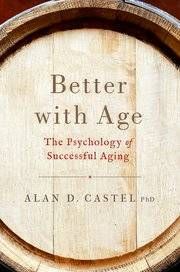What Is Successful Aging?
The 'Better With Age' author on Warren Buffett and the world's oldest person
(This article is excerpted from the new book Better with Age: The Psychology of Successful Aging by Alan D. Castel PhD. Copyright © 2019 by Oxford University Press. All rights reserved.)

The phrase “successful aging” has grown in popularity over the past few decades. At some point in life, people become concerned about aging and want to know what to expect, what to avoid and ways to adapt. New research has shown that important paradoxes exist regarding how we think about old age and how we actually age.
The term successful aging was made popular in 1987, when the scientists John Wallis Rowe and Robert Kahn published an influential book entitled Successful Aging. Rowe and Kahn stated that successful aging involved three main factors: (1) being free of disability or disease, (2) having high cognitive and physical abilities, and (3) interacting with others in meaningful ways.
Extrinsic and Intrinsic Factors of Successful Aging
Importantly, Rowe and Kahn acknowledged that successful aging involved both intrinsic genetic factors and extrinsic lifestyle factors. Extrinsic factors such as diet, exercise, personal habits and psychosocial aspects of aging are often underestimated if one takes the simplistic view that aging is guided by genetics.

Today, an exact definition of successful aging is an open debate. It is even unclear whether aging is a process or an outcome. Researchers have offered over 80 unique and different operational definitions of successful aging, with some estimating that only 1 percent of people achieve successful aging, while others estimate that close to 90 percent of people can achieve it.
Despite these discrepancies, most people can easily identify someone who exemplifies successful aging, without subjecting that person to medical testing or any psychological evaluation. Thus, successful aging is often something we simply “know it when we see it.”
Warren Buffett and Successful Aging
Many people consider Warren Buffett to be very successful professionally. After all, he is a billionaire philanthropist, and he is now 86. Is he then a model of successful aging? What are the secrets to successful aging for Warren Buffett? He is an avid Coca-Cola drinker (he reportedly drinks five cans a day), noting, “I’m about one-quarter Coca-Cola” and that he had seen no evidence that switching to “water and broccoli” would make it easier for him to make it to age 100.
Of course, Buffett’s eating and drinking habits may not be the path to successful aging, but he has identified one key to his success. Buffett credits his own success to reading voraciously; he typically spends 80 percent of his day reading. He says that reading is something many people can do at almost any point in their lives, and especially later in life, but that people rarely do enough of it.
Buffett has no plans to retire and he loves his work — he’s clearly successful professionally and apparently very happy. However, simply making money and living well in old age is only one way to conceptualize successful aging.
The Oldest Person in the World and Successful Aging
What about Jeanne Louis Calment, from France, who was born in 1875 and has the longest confirmed human lifespan on record, living to the age of 122? She said her longevity could be attributed to a diet rich in olive oil, but also to drinking port wine and eating large amounts of chocolate (not to mention smoking a few cigarettes a day since she was 20). She also stated that being calm allowed her to age well (“that’s why they call me Calment,” she said). She outlived both her daughter and her grandson by several decades. Calment reportedly remained mentally sharp until she died in 1997, at age 122, saying, “I’m interested in everything but passionate about nothing.”
In Western culture we tend to “medicalize” aging, looking for the hidden secrets of health and longevity, ideally in a pill or bottle. Health is viewed as a biological state, and “good or bad” aging as the outcome of our medical or physiological state. However, people can alter this state and have the most control over the behavioral aspects of aging — how we eat, exercise, think, and interact with others — behaviors that have a strong impact on our biological health.
Successful aging can start in childhood, as people develop habits and work ethics and learn to exercise and eat well. We often focus on the physical health of people as they age, and we assume that psychological well-being follows this trend. While physical and mental health are related, there is more to life than simply being in good physical shape.
Successful Aging and a Meaningful Life
Older people often say that successful aging involves being productive, being mentally fit, and, most importantly, being able to lead a meaningful life.
Pulitzer prize–winning author Jared Diamond says successful aging for him is enjoying life, being productive and continuing to do the things he is good at doing. He told me that age 70 was one of the best times in his life. His said his father was a physician who continued to see patients until he was 93. Today, Diamond finds ways to balance his writing with his family activities. He is currently working on his seventh book, at age 80, while also finding more time to travel with his family.
Diamond says his closest professional colleague and mentor was the biologist Ernst Mayr, who published his 22 book on his 100 birthday — certainly a role model for Professor Diamond.
What's Important to You?
Successful aging involves focusing on what is important to you, and being able to do what you want to do in old age.
While successful aging may be one way to describe how well we age, the concept of “meaningful aging” may be another important way to consider how to age well.
Meaningful aging does not involve “winners or losers” in terms of longevity and health, but rather the need to focus on what is most meaningful to a person, especially in older age. Sometimes this involves not doing more to stay active but, perhaps, doing less, giving up some control over our lives, being more mindful of others and being aware of the need to forgive and forget.
Meaningful aging encourages us all to find meaning and peace in our lives, and the effects that these practices have on how we age can, in fact, lead to a form of successful aging.

